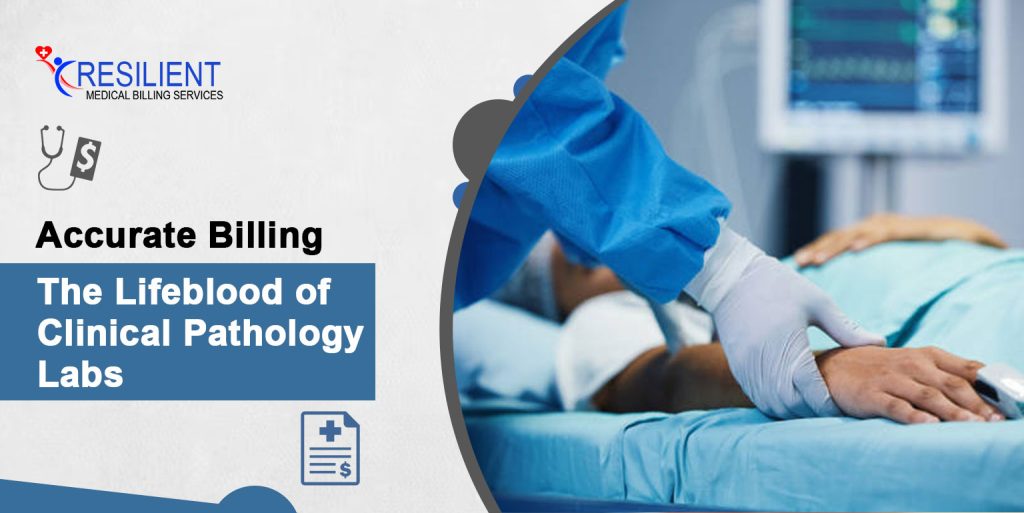Clinical pathology lab medical billing provides pathology lab services for diagnosis and monitoring. Clinical laboratories execute about 13 billion tests annually in the US, demonstrating their vital role in healthcare, according to the American Clinical Laboratory Association.
These labs need efficient billing mechanisms to get paid and stay afloat. According to studies, billing errors can destroy revenue, with 25% of claims rejected on the first submission. Medical billing for clinical pathology labs is essential, and this blog will highlight its importance and particular challenges.
What Is Clinical Pathology Lab Medical Billing?
Lab for clinical pathology Medical billing involves documenting, coding, and processing pathology lab claims. These services include many blood, tissue, and body fluid diagnostic tests. Clinical pathology lab billing includes patient data entry, test coding, charge entry, claim filing, payment posting, and denied or underpaid claim follow-up.
Importance of Accurate Coding in Clinical Pathology Lab Medical Billing
Pathology lab billing requires accurate categorization for numerous reasons. It documents lab services and sends them to insurance companies for reimbursement. Proper coding helps the lab comply with regulations, lowering audits and penalties.
Since it affects the revenue cycle, precise coding is crucial to the lab’s finances. Incorrect or inadequate coding can cause claim denials, payment delays, and considerable revenue losses.
Processes Involved In Clinical Pathology Lab Medical Billing

Patient Data Entry
It is essential that the medical billing department has the correct information on the patient they are dealing with. This Knowledge includes the patient’s history, their age, insurance details, and test orders, among others.
Test Coding
For every test conducted in any pathology laboratory, there is always a code associated with it in terms of a particular billing code, such as the CPT code.
Charge Entry
Once coding is complete, the charges pertaining to all the above-mentioned tests are billed. It confirms that all the services offered are correctly invoiced and that every service has been provided with billing.
Claim Submission
Policies are written and remitted to insurance carriers for payment. This entails the processes of assembling all the essential documents and proving that the insurance standards have been met.
Payment Posting
Upon receipt of payments from insurance companies or patients, these amounts are recorded and posted to the proper account. This is particularly helpful in ensuring that the finances are documented and any irregularities noted.
Follow-Up on Denied or Unpaid Claims
You know denial or non-payment of some claims is a regular occurrence. Employees need to pursue these claims, resolve any problems, or rebate if relevant in order to get the correct billing.
Medical Billing and Coding Errors in Clinical Pathology Lab
Clinical pathology labs can make medical billing errors at any level. These include charge entry, coding, and claim submission. Each clinical pathology lab must recognize lab coding problems. To avoid financial penalties, they should fix them quickly.
The table below lists shared clinical pathology lab medical billing errors:
Medical Coding Error
Miscoding happens when a procedure or service is coded incorrectly. Human error, coding system misunderstanding, or software problems can cause this.
Unfinished Code
Patients with incomplete or wrong information have incomplete or inaccurate data. Mistakes like transposing numbers, spelling names, or system errors might cause this.
Missing prior authorization
When insurance companies require prior authorization to cover a treatment, service, or prescription, failure to get it occurs. Without prior approval, the claim may be denied, and the patient may have to pay for medical diagnoses.
Missing Claims
Payment for late or absent claims is contingent on their submission. Claims must be completed on time to ensure payment.
Incorrect Bundled Service Coding
When a single code captures payment for procedure parts, bundled services are improperly coded. Put that code to use. Due to misunderstandings or to optimize payment, unbundling uses separate CPT codes for process aspects.
Unbilled Tests
Unbilled tests are conducted but have yet to be billed. Human error, such as forgetting to submit the test into the invoicing system, or technical faults might cause this.
Underpayments
Underpayments occur when the insurance company pays less than the lab bills. Coding faults, contract negotiations, and other causes might cause this.
Documentation Errors
Documentation errors might arise from specimen retrieval to analysis. They must be fixed for appropriate billing and claims processing.
Technology and Automation in Clinical Pathology Lab Medical Billing
Clinical pathology labs billing have several issues connected with billing management in modern conditions in the healthcare sphere.
These laboratories can significantly benefit from the utilization of technology and automation in their processes, improve their efficiency, and decrease errors and the management of the revenue cycle.
Technology is the key to enhancing the capabilities of billing for clinical pathology laboratories today. Standard practices of issuing bills involve data entry and paperwork, which tends to be slow, labor-intensive, and inaccurate.
The use of sophisticated technologies in healthcare can transform these procedures, including electronic health record systems (EHRs), laboratory information systems (LIS), and electronic billing systems. They facilitate the effective capture of the data and integration of patient records, as well as the timely processing and submission of claims, which enhances billing.
Benefits of Using Automated Billing Systems
The adoption of automated billing systems brings numerous benefits to clinical pathology labs:
- Increased Accuracy
- Enhanced Efficiency
- Cost Saving
- Improved Compliance
- Better Data Management:
Conclusion
Hospitals perform many clinical pathology labs, but these need to be stronger in billings to be lucrative. The laboratory can enhance clinical pathology lab medical billing procedures, authentications, and compliance with the help of technology and automation.
Outsourcing billing solutions can enhance the billing process of a clinical pathology lab. Resilient MBS is characterized by professional consultation and developing the best options.
Please check our website or contact us today to learn more about how we can assist you in automating your billing process. Subscribe to our blog or newsletter to learn more about the medical billing industry and new technologies.










